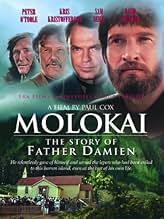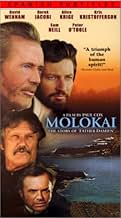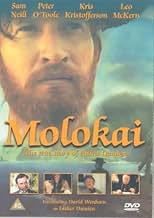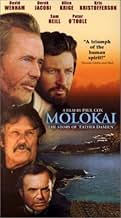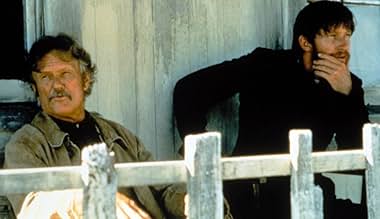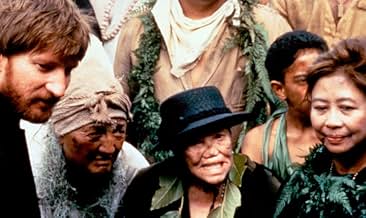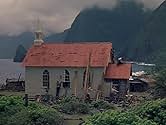IMDb RATING
6.9/10
1.5K
YOUR RATING
The true story of the nineteenth century priest who volunteered to go to the island of Molokai, to console and care for the lepers.The true story of the nineteenth century priest who volunteered to go to the island of Molokai, to console and care for the lepers.The true story of the nineteenth century priest who volunteered to go to the island of Molokai, to console and care for the lepers.
- Awards
- 1 win & 4 nominations total
- Director
- Writers
- All cast & crew
- Production, box office & more at IMDbPro
Featured reviews
I hate to be negative about a film that was obviously made with such good intentions, and I certainly don't want to offend anyone who sees Father Damien - the self-sacrificing Belgian priest - as a saint, but there isn't much that's positive to say about this inferior biopic. It isn't bad enough to be unwatchable, or good enough to deserve a second viewing. It's just very, very dull. I rented it on DVD and came to it open-minded but after half an hour I was struggling to stay awake. The opening twenty minutes are probably the best part of the movie, where the background is laid down and we see young, keen, fresh, athletic Father Damien striding off to fulfill his destiny.
I can't quite put my finger on what went wrong, although I have read of "dissension" between the director and producers. The cast, crew and financiers appear to be drawn from just about every nation on the face of the planet, and maybe that's one of the problems because the film has no distinctive "feel" to it; it's not a British movie or an Australian movie, or a Belgian movie, although all of those countries are well represented amongst the players and producers. What it so obviously lacked, was anyone strong enough on the production side to stamp some kind of distinctive character and style on it. It feels like a movie made by committee rather than created by artists. A committee may succeed in writing a technical manual, but it's not the way to create a passionate piece of cinema. And that's what it lacks. Passion.
Here we have a film set against stunning natural beauty; an ensemble cast list that reads like a Who's Who? of highly competent English speaking actors, (including Derek Jacobi, Leo McKern, Peter O'Toole, Sam Neill and David Wenham in the lead, with a mop top haircut that Ringo Starr would have envied in 1964); a moving, true story of a man who was obviously a remarkable human being; and more than enough controversy in his dealings with authority to create some real tension in the story. It's an appalling tale of the isolation and virtual abandonment of thousands of sick people from babies to grandparents, who had the misfortune to contract Leprosy at a time when it was still regarded as a biblical plague, and who were left to die alone in misery. That should be more than enough material for a really good movie, yet it's inexcusably dull, dull, dull, and really quite badly filmed. The photography looks "muddy" in shot after shot and some of the dialogue is hard to discern against what appears to be a permanent Force 8 gale.
It might work as an educational tract, (in fact it reminded me of some of the worthy but dire stuff I sat through 30 years ago in my last high school, a convent, when the teachers decided to go all "trendy" and treat us to an educational film) but it doesn't work as a cinematic piece. It would have been dull, even as a TV movie. Australian David Wenham gives an honest, engaging, workmanlike performance as the priest who arrives on Molokai expecting to take confessions and officiate at Mass, but finds himself instead making coffins for children, and trying to scrounge money for beds and medicines from uncaring superiors. Try as he might, he can't lift this one. (Anyone who has also seen Better than Sex will appreciate that he has range, and this movie is now 7 years old in fairness.) The film moves from scene to scene showing him treating the sick, comforting the dying, dragging people out of the surf, building houses etc etc. in an utterly formulaic way which never generates any real passion. He writes letters to HQ, and complains politely, but there is a remarkable lack of tension and drama in his dealings with his superiors. The sick shuffle around Molokai wrapped in rags, and we feel suitably uncomfortable, but it is all so dull. I wanted to be moved and I wasn't. Eventually Father Damien succumbs to Hansen's Disease (Leprosy) himself, literally giving his life for these forgotten people. It's a strong story that should have had audiences weeping in the aisles, but personally I was just glad when it finished. I can't really fault any of the individual performances, (in fact Aden Young was excellent as the young doctor and Sam Neill is always good value), it's just the overall effect that's so second rate.
Given the subject matter, it's really quite sad that such a good tale got such an inferior treatment. I know nothing about Father Damien but I'm sure he deserved better.
I can't quite put my finger on what went wrong, although I have read of "dissension" between the director and producers. The cast, crew and financiers appear to be drawn from just about every nation on the face of the planet, and maybe that's one of the problems because the film has no distinctive "feel" to it; it's not a British movie or an Australian movie, or a Belgian movie, although all of those countries are well represented amongst the players and producers. What it so obviously lacked, was anyone strong enough on the production side to stamp some kind of distinctive character and style on it. It feels like a movie made by committee rather than created by artists. A committee may succeed in writing a technical manual, but it's not the way to create a passionate piece of cinema. And that's what it lacks. Passion.
Here we have a film set against stunning natural beauty; an ensemble cast list that reads like a Who's Who? of highly competent English speaking actors, (including Derek Jacobi, Leo McKern, Peter O'Toole, Sam Neill and David Wenham in the lead, with a mop top haircut that Ringo Starr would have envied in 1964); a moving, true story of a man who was obviously a remarkable human being; and more than enough controversy in his dealings with authority to create some real tension in the story. It's an appalling tale of the isolation and virtual abandonment of thousands of sick people from babies to grandparents, who had the misfortune to contract Leprosy at a time when it was still regarded as a biblical plague, and who were left to die alone in misery. That should be more than enough material for a really good movie, yet it's inexcusably dull, dull, dull, and really quite badly filmed. The photography looks "muddy" in shot after shot and some of the dialogue is hard to discern against what appears to be a permanent Force 8 gale.
It might work as an educational tract, (in fact it reminded me of some of the worthy but dire stuff I sat through 30 years ago in my last high school, a convent, when the teachers decided to go all "trendy" and treat us to an educational film) but it doesn't work as a cinematic piece. It would have been dull, even as a TV movie. Australian David Wenham gives an honest, engaging, workmanlike performance as the priest who arrives on Molokai expecting to take confessions and officiate at Mass, but finds himself instead making coffins for children, and trying to scrounge money for beds and medicines from uncaring superiors. Try as he might, he can't lift this one. (Anyone who has also seen Better than Sex will appreciate that he has range, and this movie is now 7 years old in fairness.) The film moves from scene to scene showing him treating the sick, comforting the dying, dragging people out of the surf, building houses etc etc. in an utterly formulaic way which never generates any real passion. He writes letters to HQ, and complains politely, but there is a remarkable lack of tension and drama in his dealings with his superiors. The sick shuffle around Molokai wrapped in rags, and we feel suitably uncomfortable, but it is all so dull. I wanted to be moved and I wasn't. Eventually Father Damien succumbs to Hansen's Disease (Leprosy) himself, literally giving his life for these forgotten people. It's a strong story that should have had audiences weeping in the aisles, but personally I was just glad when it finished. I can't really fault any of the individual performances, (in fact Aden Young was excellent as the young doctor and Sam Neill is always good value), it's just the overall effect that's so second rate.
Given the subject matter, it's really quite sad that such a good tale got such an inferior treatment. I know nothing about Father Damien but I'm sure he deserved better.
I saw this in a film festival just yesterday. It was not really the sort of film I would go to normally (I'm not really into religious themes in film). I already knew a little of Father Damien's story, and I had a fair idea of how the story would end but I was glad I saw it just the same. I wouldn't say I "enjoyed" it because the subject matter was in many ways depressing but in a way it was an inspiring story. It showed what one man can do to improve the lives of 1000-odd suffering people that the rest of the world has all but forgotten. Damien had a will of iron and he needed it to counter the resistance of the government and his superiors in getting the help he needed.
If this sort of theme appeals to you I'm sure you will appreciate the film, if you definitely don't like religious themes then it's probably better that you don't see it.
If this sort of theme appeals to you I'm sure you will appreciate the film, if you definitely don't like religious themes then it's probably better that you don't see it.
This story is quite faithful to the facts of the life of this remarkable Belgian priest who chose to live in a leper colony while still a man in his early 30's even though he knew it to be a permanent assignment and a death sentence.
The horrors of the leper colony were conveyed realistically while still giving a focus that would allow all but very young audiences to view it. The bureaucrats, both civil and religious, are well portrayed. -- (Derek Jacobi gives his usual fine performance in one of these roles.)
This is a "must see" for anyone who has never heard the story of Father Damien or knows little about the leper colony on Molokai.
The horrors of the leper colony were conveyed realistically while still giving a focus that would allow all but very young audiences to view it. The bureaucrats, both civil and religious, are well portrayed. -- (Derek Jacobi gives his usual fine performance in one of these roles.)
This is a "must see" for anyone who has never heard the story of Father Damien or knows little about the leper colony on Molokai.
This is a surprisingly intimate look at some of Father Damien's experiences, but the dramatic structure of the film is often frustratingly fragmented.
Scenes of the authorities on O'ahu struggling with how to deal with the amazing man and his demands on behalf of his community seem to have been shot very hastily, and they fit poorly with the more carefully conceived segments from Moloka'i. Even there, the scenes with Peter O'Toole seem poorly integrated into the progression of the story.
Despite the participation of many top-flight actors and actual local victims of Hansen's disease, this film offers only fleeting, tantalizing glimpses of what could have been a tremendously powerful drama of the life of a man who may yet become an actual saint. In isolation, the leading performances are very fine, but the package failed to gel and the film is, finally, only a carefully-drawn series of vignettes.
Scenes of the authorities on O'ahu struggling with how to deal with the amazing man and his demands on behalf of his community seem to have been shot very hastily, and they fit poorly with the more carefully conceived segments from Moloka'i. Even there, the scenes with Peter O'Toole seem poorly integrated into the progression of the story.
Despite the participation of many top-flight actors and actual local victims of Hansen's disease, this film offers only fleeting, tantalizing glimpses of what could have been a tremendously powerful drama of the life of a man who may yet become an actual saint. In isolation, the leading performances are very fine, but the package failed to gel and the film is, finally, only a carefully-drawn series of vignettes.
The fact that this movie was primarily filmed in Kalaupapa on the north shore of our island, does not unduly influence my judgment that this is a very interesting movie. The acting of the "international" cast is quite fine. But so is that of my childhood friend, Keanu Kapuni-Szasz, as a young girl who contracts leprosy and later presents a slight temptation to Father Damien. Many, many "topside" Molokai residents joined with the few remaining Kalaupapa residents (who have Hansen's Disease) in this production. Viewers will be inspired by their beauty and spirit. Aloha.
Did you know
- TriviaLeo McKern's final credited movie role. He makes an uncredited appearance in Le Seigneur des anneaux : La Communauté de l'anneau (2001).
- GoofsFather Damien is shown performing a marriage between a man and a woman who was previously married but has not had an annulment granted by the Catholic Church. This is absolutely forbidden in the Church and would make the new marriage immediately invalid and cause the priest who willingly performed the marriage and the couple to be considered in a state of mortal sin. Father Damien never did any such thing and would not have.
- Quotes
Rudolph Meyer: From now on, only God can help you.
Father Damien: Yes, I often count on him.
- Crazy creditsThe opening credits play over a scene of men on horseback with dogs searching a native village for lepers who have been hidden away by their families.
- ConnectionsFeatured in On Borrowed Time (2011)
- How long is Molokai?Powered by Alexa
Details
- Release date
- Countries of origin
- Official site
- Languages
- Also known as
- Molokai
- Filming locations
- Production companies
- See more company credits at IMDbPro
Box office
- Budget
- €7,436,800 (estimated)
- Gross worldwide
- $182,695
- Runtime1 hour 49 minutes
- Color
- Sound mix
- Aspect ratio
- 2.35 : 1
Contribute to this page
Suggest an edit or add missing content


